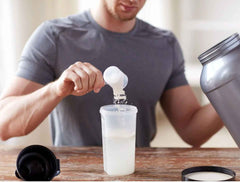How Creatine Is Made: The Truth About Its Production and Origins

Many fitness enthusiasts and vegans worry about whether creatine supplements contain animal products. This concern is understandable, given that creatine naturally occurs in meat and fish. However, understanding how creatine is made reveals that the reality of modern creatine powder production might surprise you.
The vast majority of commercial nutritional supplements available today are made through synthetic processes, not from animal sources. Understanding how this popular supplement is made helps consumers make informed choices, especially those following plant-based diets or seeking cruelty-free dietary supplement options.
In this article, we’ll explore exactly how creatine powder is made, including the synthetic processes behind modern production, the raw materials used, and how manufacturers ensure quality and vegan compliance.
Why Does Creatine Source Matter?
Creatine is a naturally occurring compound found in muscle cells throughout the body. It plays a crucial role in producing energy during high-intensity exercise and heavy lifting. Your body makes about one gram of creatine daily from amino acids, primarily in the liver, kidneys, and pancreas. Notably, creatinine, a waste product of creatine breakdown, is filtered out by the kidneys.
While creatine exists naturally in red meat and fish, many people choose supplements to boost their levels. Athletes and fitness enthusiasts often use extra creatine to improve performance, increase muscle mass, and enhance recovery. This popularity has led to massive commercial production worldwide, with quality ingredients being essential for effective results.
For vegans and vegetarians, the source of creatine matters enormously. Since plant foods contain virtually no creatine content, those following plant-based diets often have lower muscle creatine levels. However, concerns about animal-derived supplements have created demand for clearly vegan options that support proper nutrition.

The Truth About Modern Creatine Production
Modern creatine manufacturing relies almost entirely on synthetic production methods. This shift happened because synthetic creatine offers better purity, consistency, and cost-effectiveness compared to extracting it from animal sources. Major supplement companies worldwide use these synthetic processes.
Synthetic creatine monohydrate is chemically identical to the creatine found naturally in your muscles. The molecular structure remains exactly the same, meaning your body processes synthetic creatine in the same way as natural creatine. This ensures the same performance benefits without any difference in effectiveness.
The switch to synthetic production also eliminated concerns about contamination from animal sources. Early creatine supplements sometimes contained impurities from animal tissues, but modern synthetic methods produce pharmaceutical-grade purity levels consistently.
How Commercial Creatine Is Actually Made
Commercial creatine production begins with two main chemical compounds: sarcosine and cyanamide. These ingredients undergo a carefully controlled chemical reaction in industrial laboratories. The process involves mixing these compounds under specific temperature and pressure conditions.
During synthesis, sarcosine and cyanamide combine to form creatine through a condensation reaction. This process happens in large stainless steel reactors where temperature, pH levels, and timing are precisely monitored. The reaction typically takes several hours to complete properly.
After the initial synthesis, the raw creatine undergoes extensive purification. Multiple filtration stages remove any unreacted starting materials and potential by-products. The final product is then crystallised to create the white fine powder familiar to supplement users.
Quality control testing happens throughout production. Each batch gets tested for purity, potency, and contamination. Reputable manufacturers follow strict pharmaceutical standards, ensuring the final product meets safety requirements and labelled specifications. This process often involves testing alongside protein and other supplement ingredients to ensure compatibility.

Raw Materials Used in Creatine Manufacturing
Sarcosine, one of the key ingredients, comes from plant-based or synthetic sources. It can be derived from caffeine processing or produced synthetically from simple organic compounds. Modern sarcosine production typically uses synthetic methods for better purity and consistency.
Cyanamide, the other main ingredient, is manufactured from limestone and nitrogen compounds. This industrial chemical comes from mineral sources rather than biological ones. The production process involves high-temperature reactions between calcium carbide and nitrogen.
Both raw materials undergo rigorous testing before use in creatine production. Manufacturers verify the purity and origin of these compounds to ensure the final creatine product meets vegan standards. This traceability gives consumers confidence about the plant-based nature of their supplements.
Different Types of Creatine Supplements Production Methods
Creatine monohydrate, the most common form, uses the standard synthetic process described above. This represents over 90% of the global creatine market due to its proven effectiveness and cost-efficiency. The manufacturing process for creatine monohydrate has been refined over decades to achieve maximum purity levels.
Other forms like creatine ethyl ester or buffered creatine start with the same base creatine but undergo additional chemical modifications. These modifications aim to improve absorption or reduce side effects. Creatine ethyl ester involves esterification with ethanol, while buffered forms combine creatine with alkaline compounds like sodium bicarbonate.
Some manufacturers produce micronised creatine by grinding standard creatine into smaller particles. This process improves mixability and dissolution in liquids. However, the underlying creatine remains synthetically produced regardless of these physical modifications. Micronisation typically reduces particle size to 200 mesh or smaller for better solubility.
Creatine hydrochloride represents another variation where creatine bonds with hydrochloric acid. This form claims better solubility and absorption, though it still begins with synthetically produced creatine. The hydrochloride addition happens during the final processing stages after the main synthesis is complete.
Global Manufacturing Standards for Creatine Supplements
International pharmaceutical standards govern creatine production worldwide. The European Pharmacopoeia and United States Pharmacopeia set strict guidelines for purity, potency, and contamination limits. These standards ensure consistent quality regardless of the manufacturing location.
Good Manufacturing Practice regulations require detailed documentation of every production step. Manufacturers must maintain records of raw material sourcing, processing conditions, and quality testing results. This traceability helps verify the vegan status of creatine supplements throughout the supply chain.
Third-party testing laboratories regularly audit creatine facilities to ensure compliance with these standards. Independent verification provides additional assurance that products meet labelled specifications. Many reputable brands voluntarily exceed minimum requirements to demonstrate their commitment to quality.
Ensuring Your Creatine Is Vegan-Friendly
Look for clear vegan certification on supplement labels. Reputable brands display vegan symbols or statements confirming their products contain no animal-derived ingredients. Third-party certifications from recognised vegan organisations provide additional assurance about the ethical sourcing of ingredients.
Check the ingredient list carefully for any animal-derived additives. While the creatine itself is synthetic, some manufacturers add gelatin capsules, magnesium stearate from animal sources, or other non-vegan ingredients. Pure creatine monohydrate powder typically contains only creatine and sometimes natural flavourings from plant sources.
Contact manufacturers directly if you have doubts about their production methods. Reputable companies willingly provide information about their sourcing and manufacturing processes. Companies committed to vegan products usually make this information easily accessible on their websites, including detailed certificates of analysis.
Read customer reviews and third-party testing reports when available. Independent laboratories sometimes publish analysis results showing the composition and purity of popular creatine brands. These reports can confirm whether products meet vegan standards and quality expectations. For more guidance on supplementing a vegan diet, see our Veganism Basics Guide.
Common Misconceptions About Creatine Supplements
One widespread myth suggests that all creatine comes from animal sources because it naturally occurs in meat. This misconception leads many vegans to avoid creatine supplements unnecessarily. In reality, commercial creatine production abandoned animal extraction decades ago due to cost and purity concerns.
Another common belief is that synthetic creatine is somehow inferior to "natural" creatine. Scientific research consistently shows that synthetic creatine monohydrate provides identical benefits to naturally occurring creatine. The molecular structure remains exactly the same regardless of the production method.
Some people worry that synthetic production involves harmful chemicals that remain in the final product. However, the purification process removes all traces of manufacturing chemicals, leaving only pure creatine monohydrate. Pharmaceutical-grade production ensures safety standards exceed those required for food products.

Benefits of Synthetically Produced Creatine
Synthetic creatine offers superior purity compared to animal-derived alternatives. The controlled manufacturing environment eliminates variables present in biological sources. This consistency ensures each batch meets the same high standards for potency and quality, with purity levels typically exceeding 99.9%.
Environmental benefits also favour synthetic production. Manufacturing creatine in laboratories requires fewer resources than raising animals for extraction. This aligns with sustainable practices and reduces the overall environmental footprint of supplement production. Water usage and greenhouse gas emissions are significantly lower with synthetic methods.
Cost advantages of synthetic production benefit consumers through more affordable supplements. The efficiency of chemical synthesis allows manufacturers to produce large quantities at lower costs than biological extraction. These savings often translate to better value for consumers seeking high-quality creatine supplements.
Synthetic production eliminates the risk of prion diseases or other animal-borne pathogens that could theoretically contaminate animal-derived supplements. This safety advantage provides peace of mind for health-conscious consumers who prioritise supplement purity and safety.
Future Manufacturing Developments
Advances in biotechnology are exploring fermentation-based creatine production using genetically modified microorganisms. These methods could further improve sustainability while maintaining the vegan-friendly nature of creatine supplements. Several companies are investing in research to develop these next-generation production techniques.
Green chemistry initiatives focus on reducing solvent use and energy consumption in creatine synthesis. These improvements aim to make production even more environmentally friendly while maintaining product quality. Some manufacturers are already implementing cleaner production methods in their facilities.
Enhanced purification technologies continue to improve the quality of synthetic creatine. New filtration and crystallisation methods produce even purer final products with fewer impurities. These technological advances benefit consumers through higher quality supplements at competitive prices.
Conclusion
Modern creatine supplements are overwhelmingly produced through synthetic methods using plant-based or mineral raw materials. This manufacturing approach ensures vegan-friendly products while maintaining the same effectiveness as naturally occurring creatine. The shift to synthetic production has eliminated concerns about animal-derived ingredients in most commercial creatine supplements.
Understanding how creatine is made empowers consumers to make informed choices aligned with their dietary preferences and ethical values. The synthetic production process delivers consistent quality, purity, and potency without compromising vegan principles.
For complete peace of mind, choose a brand that clearly commits to plant-based ingredients. Explore Vegan Creatine Monohydrate Powder and see how it can support your training goals while staying true to your ethics.
To learn more about supporting your plant-based fitness journey feel free to contact us — we’re happy to help you choose the right supplements for your goals.









